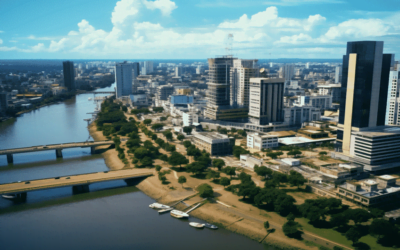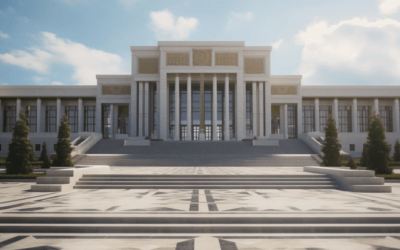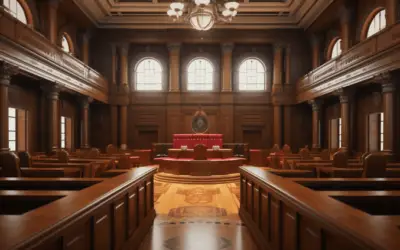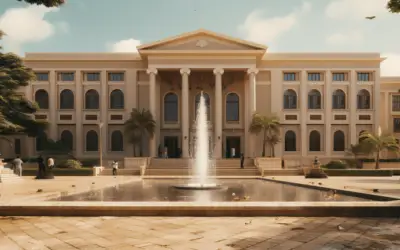Hey there, fellow drone enthusiast or curious reader! Are you looking to spread your wings, quite literally, by navigating the Algerian skies with your trusty drone?
Or perhaps you’re simply eager to stay informed about the evolving drone regulations in Algeria?
Well, you’re in the right place because I’ve been down that research rabbit hole, and I know just what you’re after.
You see, I’ve delved into the world of Algeria’s drone laws with an insatiable curiosity. I’ve done the legwork, combed through the rules and regulations, and even peeked at the latest updates.
The aim?
To provide you with the most up-to-date and comprehensive guide on Algeria’s drone laws.
I’ve got your back! Whether you’re a recreational drone pilot, a budding photographer looking to capture Algeria’s stunning landscapes, or a business owner seeking to use drones for commercial purposes, I’ve got the answers you seek.
So, if you want the inside scoop on navigating the intricacies of Algeria’s drone regulations, you’re in the right place. My article is your passport to understanding the ins and outs of drone laws in Algeria.
From registration and flight restrictions to privacy considerations and penalties for non-compliance, I’ve got it all covered. Join me on this journey through the Algerian skies and explore the world of drone regulations.
Keep reading, and let’s unravel the fascinating world of Algerian drone laws together!
- Registration and Licensing
- No-Fly Zones and Restricted Areas
- Altitude and Distance Restrictions
- Drone Permits and Special Permissions
- Surveillance and Privacy Considerations
- Consequences of Violating Drone Laws
- Tips for Safe and Responsible Drone Flying
- Resources and Contacts
- Final Thoughts on Algeria Drone Laws
- Frequently asked question
Registration and Licensing

Alright, let’s kick things off by diving into the nitty-gritty of Algeria’s drone laws. If you’re thinking about flying a drone in this beautiful North African nation, you’ll need to understand the rules around registration and licensing. So, fasten your seatbelts, or should I say, strap on your pilot goggles, and let’s explore this airspace.
The requirement to register drones with the Direction Générale de l’ Aviation Civile (DGAC)
First things first, when you’re itching to take your drone for a spin in Algeria, you’ll want to be on the right side of the law.
The DGAC, the Algerian civil aviation authority, expects drone owners to register their flying companions. It’s like having a driver’s license for your drone, and it’s an essential step to ensure the safety of your aerial adventures.
Information needed for registration
So, what do they want to know? Well, it’s a bit like adopting a pet—you’ll need to provide some essential information about your drone. Think of it as filling out an adoption form at a shelter.
You’ll typically have to share details like the make and model of your drone, its weight, and your contact information. It’s not too complicated, but it’s essential for keeping tabs on all those drones buzzing around.
Differentiating between recreational and commercial drone operation
Now, let’s talk about the purpose of your drone flights. Are you flying for the pure joy of it, like capturing stunning aerial shots of Algeria’s picturesque landscapes, or are you planning to put your drone to work, perhaps for a business venture?
The reason matters because there are different sets of rules for recreational and commercial drone operations. You could say it’s akin to the distinction between driving your car for personal use and using it for a delivery service.
Overview of drone pilot licensing, if applicable
Oh, and here’s a little something extra. Depending on your drone’s weight and the intended use, you might need a pilot’s license.
That’s right, just like a driver’s license for your drone! It’s not required for every drone, but if your craft is on the heavier side or you’re operating it for commercial purposes, you may need to go through the process of getting certified.
Think of it as upgrading from a learner’s permit to a full-fledged driver’s license. It’s all about ensuring safety in the skies.
So, there you have it—the first steps in our journey through Algeria’s drone laws.
We’ve covered the need to register your drone with DGAC, the information you’ll need for registration, the distinction between recreational and commercial drone operation, and a glimpse at drone pilot licensing. But wait, there’s more to explore in this captivating world of drone regulations! Stick around, and we’ll navigate the skies together.
No-Fly Zones and Restricted Areas

Alright, let’s put on our virtual air traffic controller hats and talk about no-fly zones and restricted areas in the context of Algeria’s drone laws.
Just like there are off-limits areas on the ground, the sky has its own share of restricted zones, and knowing where not to venture with your drone is crucial.
Identifying areas where drone flights are strictly prohibited
You’re all set to explore the Algerian skies with your trusty drone, and you’re raring to go. But wait, not so fast! Before you take off, you’ll need to be aware of the areas where drone flights are an absolute no-no.
These are the spaces where you won’t be able to legally spread your drone’s wings. It’s like knowing where the “Do Not Enter” signs are on a road trip.
Typical no-fly zones
So, what are these forbidden zones like? Well, think about places that are ultra-sensitive or crowded with aircraft. Military installations, government buildings, and airports top the list.
Drones buzzing around these areas could cause quite a stir and not the good kind. It’s like trying to set up a picnic in the middle of a busy highway – not the safest or most sensible choice.
Special permissions for accessing restricted areas (if any)
But hey, if you’ve got a solid reason and a green light from the powers that be, there may be a way to access these restricted areas.
Special permissions, also known as waivers, can sometimes be granted for drone flights in these sensitive zones. It’s like getting an exclusive backstage pass to a concert—not everyone gets one, but if you have a legitimate purpose, it’s worth exploring.
So, remember, in the world of drone flying, knowing where you can’t go is just as important as knowing where you can.
We’ve covered the areas where drone flights are strictly prohibited, the typical no-fly zones, and the possibility of obtaining special permissions for accessing restricted areas. Stay tuned for more insights into Algeria’s drone laws; there’s a lot more to explore in this fascinating airspace.
Altitude and Distance Restrictions

Now, let’s set our sights a bit higher—quite literally—and talk about altitude and distance restrictions for drone flights in Algeria.
It’s not just about taking off and having fun; it’s about knowing how high you can go and how far you should stay from people, property, and other flying machines.
Maximum altitude limits for drone flights
You’ve probably marveled at those jaw-dropping aerial shots and wondered just how high drones can soar. Well, here’s the scoop: Algeria, like many places, has a ceiling for drone flights. Typically, the limit hovers around 120 meters, or roughly 400 feet.
It’s a bit like having a leash for your four-legged friend—it keeps your drone from wandering too far into the skies.
Maintaining safe distances from people, property, and vehicles
Now, let’s talk about personal space. Just like you wouldn’t want someone invading your personal bubble, you’ve got to respect the personal space of others too.
Drones need to maintain a safe distance from people, property, and vehicles not involved in the flight. It’s a safety rule designed to prevent accidents and protect privacy. Think of it as the unwritten rule of giving people enough elbow room in a crowded elevator.
The importance of respecting airspace regulations to avoid collisions
Here’s the bottom line: respecting airspace regulations is not just about following the rules but also avoiding potential collisions. The last thing you want is a mid-air mishap with another drone or even a manned aircraft.
Think of it like the lanes on a highway; if everyone stays in their lane, there are fewer chances of fender-benders. So, flying within altitude limits and keeping a safe distance is about making sure you, your drone, and the skies stay accident-free.
So, there you have it—the essentials of altitude and distance restrictions in Algeria’s drone laws. We’ve covered maximum altitude limits, the importance of maintaining safe distances, and the significance of respecting airspace regulations.
But hang tight; there’s more to uncover as we continue our journey through Algeria’s drone regulations.
Drone Permits and Special Permissions

Introduction: Alright, now we’re entering the territory of drone permits and special authorizations. You know, the backstage passes of the drone world! Whether you’re aiming for a unique drone flight or considering a commercial venture, understanding when and how to get these permits is essential.
Circumstances requiring drone permits or special authorizations
Picture this: you’re an avid photographer, and you’ve got your eye on a magnificent, yet somewhat restricted, location for a drone photo shoot.
Or, you might be planning a commercial operation that goes beyond the usual recreational flights. In these scenarios, you’ll likely need a special permit or authorization to fly your drone legally. It’s akin to getting a permit to host a concert in a public park; the authorities want to make sure everything goes smoothly.
Application process and associated fees
Now, let’s talk about the process. Applying for a drone permit can be a bit like going through the paperwork for a special event. You’ll need to submit your request to the relevant authority, which in Algeria’s case is likely the DGAC.
There might be associated fees, just as you’d expect to pay for reserving a space for that concert. The amount can vary depending on the type of permit and the scope of your operation, but it’s all part of ensuring that your drone activities meet the necessary safety and regulatory standards.
Commercial drone operations and their specific requirements
If you’re planning to use your drone for commercial purposes, there are additional requirements to consider. It’s like opening a food truck—beyond the standard business license, you need to meet specific health and safety regulations.
For commercial drone operations in Algeria, you may need to provide additional documentation, demonstrate safety measures, and follow certain guidelines. It’s all about maintaining the safety and security of the airspace.
So, when you’re thinking about drone permits and special permissions, remember that they’re not just paperwork; they’re your ticket to exploring new heights and opportunities.
We’ve discussed the circumstances requiring permits, the application process and fees, and the additional requirements for commercial drone operations. But the journey through Algeria’s drone laws is far from over; more insights await as we delve deeper into the regulations.
Surveillance and Privacy Considerations

Introduction: Alright, let’s shift our focus to something that’s incredibly important when it comes to drone operations: surveillance and privacy considerations.
Drones can capture stunning views, but they can also raise some eyebrows, especially in the realm of privacy. So, let’s take a closer look at this essential aspect of drone use.
Privacy concerns related to drone use
Imagine you’re in your backyard, enjoying a sunny day, and suddenly, you hear a buzz above you. A drone is flying nearby, and it’s not exactly giving you the privacy you expected. That’s one of the privacy concerns that can arise with drones.
People worry about their private moments being unintentionally recorded or their properties being intruded upon. It’s a bit like feeling someone peering through your window – not the most comfortable feeling, right?
Laws governing surveillance and data collection
Now, when it comes to drone use and privacy, there are laws and regulations in place to maintain a balance. These laws dictate how drones can be used for surveillance and data collection. Just as there are rules about how security cameras can be used, drones have their set of guidelines.
These rules aim to ensure that individuals’ rights to privacy are respected, even in the sky. It’s like having clear guidelines for how and when security cameras can be installed in public places.
Best practices for protecting individuals’ privacy while operating drones
But it’s not all doom and gloom. There are ways to enjoy the benefits of drones without intruding on privacy. Best practices for drone enthusiasts include flying at a respectful altitude, avoiding capturing private spaces, and seeking permission when necessary.
It’s like practicing good neighborly behavior—respecting their boundaries and privacy. By adhering to these best practices, drone pilots can capture breathtaking shots without compromising privacy.
So, in the world of drones, it’s not just about the technical aspects but also about respecting privacy and following the rules.
We’ve delved into the privacy concerns related to drone use, the laws governing surveillance and data collection, and the best practices for protecting individuals’ privacy. But there’s more to explore as we continue our journey through Algeria’s drone laws.
Consequences of Violating Drone Laws

Now, let’s talk about the consequences of playing fast and loose with drone laws. Drones are fantastic tools for capturing breathtaking moments, but breaking the rules can lead to a less-than-picture-perfect ending. So, let’s explore what can happen if you veer off the legal flight path.
Overview of potential penalties for violating drone regulations
Consider this scenario: you’re buzzing your drone in a no-fly zone or flying higher than the legal limit, and suddenly you’re confronted by authorities.
In Algeria, as in many places, violating drone regulations can come with penalties. These can range from fines to even more severe consequences, depending on the nature and severity of the violation. Think of it like getting a traffic ticket – the consequences can vary depending on the offense.
Legal consequences, fines, and potential confiscation of equipment
Now, let’s delve a bit deeper. When it comes to breaking drone laws, you’re not just facing a slap on the wrist. Depending on the circumstances, you might be looking at substantial fines, and in some cases, they might even seize your drone. It’s like facing a hefty fine and having your car impounded for reckless driving. It’s not something anyone wants to experience.
The importance of adhering to laws to ensure a safe and responsible drone operation
But let’s not forget the bigger picture. Adhering to drone laws is not just about avoiding fines; it’s about ensuring a safe and responsible drone operation. Drones share the airspace with other aircraft, and respecting the rules is crucial for preventing accidents and maintaining order in the skies. It’s like following traffic laws to prevent collisions and keep the roads safe for everyone.
So, remember, when you’re piloting your drone, following the rules isn’t just about staying out of trouble – it’s about being a responsible and safe operator.
We’ve explored the potential penalties for violating drone regulations, the legal consequences, fines, and the importance of adhering to laws for a safe and responsible drone operation. But our journey through Algeria’s drone laws isn’t over yet – there’s more to discover in the world of drones.
Tips for Safe and Responsible Drone Flying

Let’s get into the nitty-gritty of safe and responsible drone flying. Whether you’re an experienced pilot or just starting your journey, these tips are crucial for ensuring smooth and secure flights. Think of them as your trusty checklist for navigating the skies responsibly.
Pre-flight checklist and safety precautions
Before every flight, it’s a good practice to go through a pre-flight checklist. Much like a pilot preparing for takeoff, you’ll want to ensure your drone is in good shape, the batteries are charged, and you have all the necessary equipment.
It’s like checking your car’s tires, brakes, and fuel before embarking on a road trip—a little preparation goes a long way in ensuring a trouble-free journey.
Weather considerations and planning
Now, picture this: you’ve got an exciting drone flight planned, but the weather takes a sudden turn for the worse. Just as you’d rethink a picnic in the park during a thunderstorm, it’s essential to consider the weather before your drone takes flight.
Wind, rain, and low visibility can all impact your drone’s performance. So, it’s crucial to check the weather forecast and plan your flights accordingly.
Monitoring battery life and signal strength
Drones are pretty smart these days, but even the smartest gadgets need babysitting. Monitoring your drone’s battery life and signal strength during flight is vital.
It’s a bit like keeping an eye on your phone’s battery when you’re out and about – you wouldn’t want it to die on you in the middle of an important call. The same goes for your drone; keeping an eye on these parameters ensures a safe return.
Emergency procedures for drone malfunction or loss of control
Lastly, let’s talk about what to do when things don’t go as planned. Drones can sometimes misbehave due to technical glitches or unexpected obstacles.
In such situations, having emergency procedures in place is crucial. It’s like knowing what to do if your car suddenly stalls on the highway—you need to react quickly and safely. Understanding how to regain control or land your drone safely in emergencies is an essential part of responsible drone flying.
So, there you have it—a set of tips to ensure safe and responsible drone flying. We’ve covered the importance of a pre-flight checklist, weather considerations, monitoring battery life and signal strength, and emergency procedures. But the journey through Algeria’s drone laws continues with more valuable insights. Stay tuned for more drone adventures!
Resources and Contacts

Alright, let’s wrap up our journey through Algeria’s drone laws by talking about resources and contacts. When you’re exploring the world of drone regulations, you’re not alone, and it’s essential to know where to find information and who to reach out to for guidance. Consider this the treasure map to unlock the secrets of responsible drone flying in Algeria.
Where to find the most up-to-date information on Algeria’s drone laws
First things first, staying up-to-date is key when it comes to navigating drone regulations. Just like checking the latest weather forecast before your outdoor plans, you’ll want to find the most current information on Algeria’s drone laws.
The DGAC’s official website is a valuable resource where you can find updated regulations, announcements, and relevant documents. It’s like having the most recent edition of a guidebook before setting off on a trip—you want to know the latest.
Contact information for relevant government agencies and authorities
Sometimes, you might have questions or need clarification about specific regulations or permits. That’s when it’s handy to have contact information for relevant government agencies and authorities. The DGAC is your go-to source for inquiries related to drone laws. Think of them as your customer service hotline; they’re there to assist with your drone-related queries.
Online resources and forums for the Algerian drone community
But let’s not forget the power of community. Online forums, social media groups, and communities are excellent places to connect with fellow drone enthusiasts, exchange tips, and share experiences.
It’s like joining a club of like-minded individuals who share your passion. Engaging with these online resources can provide valuable insights and a sense of belonging within the drone community.
So, there you have it—your guide to resources and contacts for your drone adventures in Algeria. We’ve covered where to find the most up-to-date information on Algeria’s drone laws, contact information for relevant government agencies and authorities, and the online resources and forums available for the Algerian drone community. With this knowledge in your toolkit, you’re well-prepared for your drone journeys in Algeria. Happy flying!
Final Thoughts on Algeria Drone Laws

As our journey through Algeria’s drone laws comes to a close, let’s take a moment to reflect on the importance of understanding and complying with these regulations. Drones have opened up incredible possibilities for capturing breathtaking moments, but with great power comes great responsibility. So, here’s our final destination, the conclusion of our drone adventure.
Recap of the importance of understanding and complying with Algeria’s drone laws
To sum it up, understanding and complying with Algeria’s drone laws are not just legal obligations but also keys to ensuring safe and responsible drone use.
Just as you’d follow traffic rules on the road, adhering to drone regulations is about maintaining order in the skies and preventing accidents. These laws protect privacy, security, and the harmony of our shared airspace.
Encouragement for responsible drone use to ensure safety and privacy for all
As drone enthusiasts, it’s our responsibility to use this incredible technology in a way that benefits everyone. It’s like being a good neighbor – respecting boundaries, ensuring privacy, and promoting safety for all. Responsible drone use is about capturing stunning moments without compromising the privacy and security of others.
Emphasis on keeping up-to-date with any changes in drone regulations in Algeria
One last piece of advice before we land this drone adventure – keep an eye on the ever-evolving landscape of drone regulations. Just as you’d check for flight updates before a journey, stay informed about any changes in Algeria’s drone laws. The world of drones is dynamic, and staying up-to-date ensures that your flights remain safe and within the bounds of the law.
Frequently asked question
1. Can I fly a drone in Algeria without registering it?
No, it’s mandatory to register your drone with the Direction Générale de l’Aviation Civile (DGAC) in Algeria. Failure to do so can result in legal consequences.
2. Are there altitude restrictions for drone flights in Algeria?
Yes, there are altitude limits in Algeria’s drone laws. Typically, drones are not allowed to fly above 120 meters (approximately 400 feet) to ensure the safety of manned aircraft and other drones.
3. What are the consequences of violating Algeria’s drone laws?
Violating drone laws in Algeria can lead to penalties, including fines and potential confiscation of your equipment. It’s crucial to adhere to these laws to ensure safe and responsible drone operations.
4. How can I protect people’s privacy while flying a drone in Algeria?
To protect individuals’ privacy, it’s essential to fly at a respectful altitude, avoid capturing private spaces, and seek permission when necessary. Adhering to best practices ensures that your drone flights respect privacy while capturing stunning footage.
5. Where can I find the most up-to-date information on Algeria’s drone laws?
The most up-to-date information on Algeria’s drone laws can be found on the official website of the Direction Générale de l’Aviation Civile (DGAC). This resource provides access to the latest regulations, announcements, and relevant documents to keep drone enthusiasts informed and compliant.













